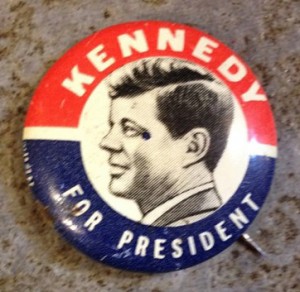By Virginia Garrard-Burnett.
On November 22, 1963, I was coloring, the tip of my new red Crayola, irritatingly, already worn down to a nub. A neighbor—the first adult I had ever seen weep–came to the back door. “Go get your mother,” she screamed, “the President’s been shot.”
The horror of that day seared itself on everyone who lived through it, but the assassination of John F. Kennedy resonated especially in the bright, late autumn light of our house that morning. Texas was a blue state in those days, and although the President had many enemies in Dallas, he was dearly beloved in our small town by my parents and their many friends. We had, in fact, considered going to Dallas that day to see him and his smiling, pretty wife. At the age of just-turned-six, I fancied that the Kennedys resembled my own dark-haired parents, and their daughter, Caroline, was my own age exactly. Like us, the Kennedys had also had a baby in the late summer of that year, but unlike my new little sister, their child had not lived. My mother had ultimately decided to stay home that day, daunted by the prospect of a long wait in the Dallas sun with an infant and a small child. Her best friend, Betty, however– a housewife and activist in county Democratic politics– planned to attend the luncheon for Democratic party leaders at the Dallas Apparel Mart that was the fateful motorcade’s destination. But as was so often the case for women back then, family obligations also kept her at home at the last minute. It was only at the end of that dreadful day that Betty realized that she was still wearing the Kennedy for President button (above) that she had put on that morning to wear to the luncheon in Dallas.
My memories of then are those of a child—the red-eyed adults, their shame, the steady drum-beat of news on a grainy black-and-white TV, the weight of sadness on everyone’s heart, and, perhaps most of all, the loss of a father who was—in my mind—so like my own. The Kennedy assassination was the first time in my life that I understood that not every story has a happy ending; that evil and hatred can cast such dark shadows that even adults—good people—cannot always provide shelter from them. My parents were devout, religious people, and our tradition is one that emphasizes hope and redemption; to this we clung, as I continue to today. But ever since that bright November morning, I have always known in the back of my mind that a shot can ring out at any time, right out of nowhere.
November 19, 2013

